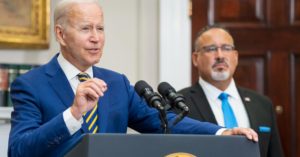Frédéric Bastiat is justifiably famous among believers in liberty. His many classic contributions include The Law and his essays “Government” and “That Which Is Seen and That Which Is Not Seen,” not to mention some of the best reductio ad absurdum arguments ever (such as “The Candlemakers’ Petition” and “The Negative Railway”) and more. Less well known are other essays, such as his election manifesto of 1846, which illustrated what a principled politician who believed in liberty would stand for.
However, far fewer people seem to be very aware of Bastiat’s Economic Harmonies, which was to be his magnum opus but was cut short by his Christmas Eve death at only age 49.
I found that strikingly illustrated when I recently reread chapter 4, “Exchange,” in Economic
Articles by Gary Galles
Remembering the Great Henry Hazlitt on His Birthday
December 13, 2023Henry Hazlitt, a great champion of liberty and Austrian economics, was born on November 28, 1894. His most famous book, Economics in One Lesson, remains a best seller thirty years after his death.
Original Article: Remembering the Great Henry Hazlitt on His Birthday
[embedded content]
Tags: Featured,newsletter
Read More »Understanding Our Disharmony
December 5, 2023One of the political trends of the past few years has been an expanding disconnect between political unity rhetoric and the increasing disharmony politicians’ proposals create.
The root of this beltway cognitive dissonance is the rapid increase in government power. Unity rhetoric helps mobilize candidates’ political bases and can sway some independents, helping win elections. However, their postelection expansion of government power into areas where people have dramatically or even diametrically opposed beliefs about Washington’s legitimate role, combined with the fact that government can give nothing it does not first take, guarantees growing disharmony. Once such choices are appropriated into government hands, there is only the question of whose preferences will
The More Complex the Society, The Less Government Control We Need
December 2, 2023Progressives claim that perhaps individual freedom might be appropriate for a simpler society but that as society grows more complex, the need for government grows. As Leonard Read pointed out, however, greater complexity requires greater freedom, not less.
Original Article: The More Complex the Society, The Less Government Control We Need
[embedded content]
Tags: Featured,newsletter
Read More »Are Businesses Entitled to a Fair Profit?
November 23, 2023In my experience of public policy discussions, one of the most frequent weasel words used as an intended trump (not Trump) card has been “fair.”
Like another commonly played political trump card, “need,” fairness does not have a clear meaning. That provides a great deal of wiggle room for equivocation, almost always used to justify forcing some Americans to pay for what someone else wants.
Fairness has no universal meaning beyond “more for me or those I care about” or “I want, but I do not want to pay for.” I learned that decades ago from my children, who wielded the word almost exclusively to advance their narrow self-interests. For instance, when my daughter—who as the oldest had more responsibility and a bigger allowance—complained, it was because having more
Smarter Talk Is Smarter Action
June 16, 2023Leonard Read asked how we preserve liberty in a culture that doesn’t appreciate it. Liberty cannot come through force and organization. It comes from within oneself.
Original Article: "Smarter Talk Is Smarter Action"
[embedded content]
Tags: Featured,newsletter
Read More »Call Rent Control What It Really Is: Theft
June 15, 2023As reported by Reason, Colorado—one of thirty-one states that had banned its local governments from imposing rent control—is considering repealing that ban. Recent efforts to allow or impose similar controls have also taken place in New York, California, Massachusetts, Oregon, and Minnesota. However, there is a good reason that most states still ban the local imposition of rent control laws.
The key reason is that the primary advantage of local determination in a federal system—allowing people mistreated by one government body to better protect themselves by “voting with their feet” to less abusive jurisdictions—does not apply to rent control laws. That is because neither selling nor moving allows owners of rental property to escape the imposed burdens.
In many
There Is No Moral Right to Strike
June 8, 2023American law protects what is called the "right to strike." However, Leonard Read found no moral code that permits such action.
Original Article: "There Is No Moral Right to Strike"
[embedded content]
Tags: Featured,newsletter
Read More »To Avarice No Sanction
June 8, 2023“No point in the field of political economy merits more thought and analysis than where to draw the line distinguishing the functions proper to government from the role assumed by all-out government—socialism. A good society is but a dream unless this issue be reasonably resolved.”
This is how Leonard Read opened chapter 9, “To Avarice No Sanction,” in his 1972 book, To Free or Freeze: That Is the Question. While he addressed that question from multiple angles in his writing, here he takes his cue from Austin O’Malley’s statement that “all fallen nations lost liberty through avarice which engendered injustice.” Read concludes that a nation should “never admit a law to the statute books that makes an appeal to avarice.”
Government . . . means laws backed by force.
Living by a Premise
June 6, 2023More than forty years ago, Leonard Read urged graduates of Hillsdale College to find a premise, a belief in a universal idea of liberty.
Original Article: "Living by a Premise"
[embedded content]
Tags: Featured,newsletter
Read More »Smarter Talk Is Smarter Action
June 1, 2023Americans have long thought of themselves as people of action.
As Leonard Read noted in his article “How to Gain Liberty,” the sentiment “I want less talk and more action” is (or at least once was) common among Americans. It even extends to situations when people recognize that their liberties are threatened. But then the question arises as to what sorts of action are appropriate in defense of our liberties:
Thus speak Americans when they suddenly awaken to the fact that their liberties are endangered. Talk, they say, is useless; only action counts. But perhaps talk and action aren’t necessarily opposites. What if studying, talking, writing, and explaining should turn out to be the only worthwhile action there is? What then?
The issue arises because not all
Comprehensive Reform versus Piecemeal Reform
May 25, 2023Should political reform be the result of a much-discussed comprehensive plan? Or should it come about through decentralized decision-making that deals with the situations at hand?
Original Article: "Comprehensive Reform versus Piecemeal Reform"
[embedded content]
Tags: Featured,newsletter
Read More »There Is No Moral Right to Strike
May 25, 2023Americans are in a time of rising labor unrest and activism, including multiple unionization campaigns, regulatory and legal changes to make it easier for unionization efforts to succeed, the “Fight for $15” minimum wage agitation, and the Hollywood writer’s strike. However, such discussions and campaigns seldom approach the issues involved from a moral perspective, beyond the implicit presumption that trying to force others to give you a raise must be moral.
That is why it is worth reconsidering Leonard Read’s bold argument that “There Is No Moral Right to Strike” in his The Coming Aristocracy (1969): “Rarely challenged is the right to strike. While nearly everyone in the population, including the strikers themselves, will acknowledge the inconvenience and
Comprehensive Reform versus Piecemeal Reform
May 9, 2023In the previous two articles in this three-part series on bipartisan comprehensive political reform, we dealt with the excuses for extortion and evasion such claims for reform provide and with the fact that such claims often lead to more comprehensive ignorance being applied to social problems. Now, we turn to the question of comprehensive reform versus piecemeal reform.
When it comes to bipartisan comprehensive political reform, beyond its rhetorical use to enable government abuses along with its massive destruction of usable information and inaccurate accounting of the costs of government, there is still another issue. The presumption that comprehensive political plans must be preferred over piecemeal improvements is highly questionable.
As Friedrich Hayek has
Bipartisanship Is Not a Substitute for Voluntary Exchange
March 28, 2023Besides using bipartisan comprehensive political reform as a cover for evasion and extortion, the many political abuses of posturing, window dressing, and maneuvering enabled do not exhaust the problems involved. Those problems are, instead, far more comprehensive, especially when it comes to the amount of usable information that is accessible, including accurate information about the true costs of government programs.
As Ludwig von Mises, Friedrich von Hayek, and many others have clearly laid out, centralizing decisions in the hands of politicians and bureaucrats requires that many valuable details of time, place, and circumstance, which can be known only to those directly involved, must be discarded from the decision-making process.
Substituting political
Don’t Take Liberties with Liberty
March 23, 2023Have you ever thought about the relationship between the words liberty and freedom? Frequently, the words are used interchangeably, but I have always preferred liberty.
Perhaps my preference goes back to Thomas Jefferson’s reference to “life, liberty, and the pursuit of happiness” in the Declaration of Independence. Perhaps it traces to Patrick Henry’s “Give me liberty or give me death.” Perhaps it is because “with liberty and justice for all” is “the most important phrase in the Pledge of Allegiance,” according to Harvard political theorist Danielle Allen. In a more analytical sense, it could come from John Stuart Mill’s essay “On Liberty” and its contrast between freedom to act and the absence of coercion, or Isaiah Berlin’s distinction between positive liberty
Why Biden’s Spending Is Unsustainable
March 16, 2023It’s popular for politicians to claim they will never cut Social Security. But doing nothing now about the program means imposing an even larger hit on seniors in the future.
Original Article: "Why Biden’s Spending Is Unsustainable"
This Audio Mises Wire is generously sponsored by Christopher Condon.
[embedded content]
Tags: Featured,newsletter
Read More »Fiscal Illusion and Entitlements
March 9, 2023As the State of the Union address and subsequent pronouncements have made clear, American politics is in the firm grip of fiscal illusion.
One example is President Biden’s bragging that “In the last two years, my administration has cut the deficit by more than $1.7 trillion—the largest deficit reduction in American history,” which implied that we should only look at a short run effect which had little, if anything, to do with the policies he adopted, in evaluating his fiscal policy.
However, he did not mention that the CBO estimates that the average yearly federal deficit over the next decade will be $1.6 trillion (under current policies, not including any expansions that have not yet been enacted), which implies his current policies continue to massively rip off
Why You Should Fear “Bipartisan” Agreements in Congress
March 1, 2023When we see real bipartisan action in Congress, it usually is for the worst.
Original Article: "Why You Should Fear "Bipartisan" Agreements in Congress"
This Audio Mises Wire is generously sponsored by Christopher Condon.
[embedded content]
Tags: Featured,newsletter
Read More »Joe Biden Calls for the FTC to Resurrect the Robinson Patman Act. It’s a Very Bad Idea
February 17, 2023As former Federal Trade Commission (FTC) chairman Timothy J. Muris has recently noted, “President Biden rejects the economics-driven antitrust policies of the past 40 years.” In contrast, President Joe Biden “promised to return to earlier antitrust traditions.” Unfortunately, “those traditions were abandoned for good reason: they harmed consumers.”
An important illustration Muris uses is the 1936 Robinson-Patman Act (RPA), which used to be a lynchpin of antitrust enforcement. After “withering” and “devastating” academic and legal criticisms that “excoriated” FTC enforcement, the agency began moving away from the act half a century ago. However, despite the fact that, in the words of Richard Posner, “The Robinson-Patman Act . . . is almost uniformly condemned by
Subsidizing Higher Education Is Not Creating Widespread External Benefits
February 6, 2023President Biden’s student debt relief proposal created a storm of controversy. That is not surprising, since it was a transparent (and apparently successful) attempt to buy the votes of an important Democratic constituency, even though it created a target-rich environment for critics.
It is sharply pro-rich at the expense of those far poorer, from a party pretending to stand for the opposite. It is very costly to everyone else (the National Taxpayers Union put the average burden at just over $2500 per taxpayer). The income cutoffs, designed to make it appear it is less pro-rich than it is, are misleading because most affected are in the early parts of their careers, when their incomes are lower, even though their average lifetime incomes (wealth, in present value
Can We Have Scarcity but Reject the “Scarcity Mindset?” in a Word, No
October 25, 2022Since I am an economist and my school year is not too far along, my classroom discussion of how all of economics traces back to the fact of scarcity (the combination of limited resources, which implies a limited ability to produce, along with wants that always exceed the amount that can be produced) facing everyone was quite recent. That was why Brad Polumbo’s recent article, “What AOC and Nina Turner Get Wrong about the ‘Scarcity Mindset,’” so quickly drew my attention.
It is the fact that each of us on earth faces scarcity that drives economics as a field (and why I tell my students it will only help them on earth, and not in heaven, since we are told there will be no scarcity there). Scarcity implies that we must choose among the goods and services which we
A Cliché of Socialism: Under Public Ownership, We the People Own it!
October 8, 2022Foundation for Economic Education founder and cornerstone Leonard Read always had an ear out for widely accepted but misleading clichés that served to aggrandize government power and limit liberty. In his 1965 “A Cliché of Socialism: Under Public Ownership, We the People Own It!” He focused his attention on the large gap between public ownership of assets and the idea that “we the people” own them.
Read pointed out that not only is public ownership misunderstood, but that goods privately owned by another party are, in fact much more available to an individual’s control than goods supposedly owned in common by we-the-people:
Public ownership and government control are synonymous terms—two ways of expressing an identical concept.
The popular notion is that a
The Government Runs the Ultimate Racket
July 29, 2022“Seniors hurt in Ponzi scam” headlined the story of elderly Southern Californians bilked in a pyramid scheme. While sad, the story reminded me of Social Security, since it is also a Ponzi scheme involving those older, with high payoffs to early recipients coming from pockets of later participants. With Social Security, however, it benefits those older at others’ expense.
Pyramid scams collapse when they run out of enough new “investors” to pay earlier promises. Some use this fact to deny that Social Security is really a massive redistribution scheme, since it has lasted over 70 years. That assertion misses two substantial differences between Social Security and other Ponzi schemes however: Social Security involves far longer generations, with people collecting on
Why “Macro” Thinking in Economics Is Such a Problem
December 22, 2021As someone who teaches public finance (better termed the economics of government), I can’t count how many times I have heard politicians promise “comprehensive” reforms to some major problem. But what such efforts actually produce is always different from what is promised, because such achievements are beyond government’s competence. The more comprehensive the “reforms” (say, measured by the number of pages in a bill), the more adverse incentives undermining social cooperation are created and the less freedom survives. Of course, when the political goal is the “unity” of 50 percent + 1 in reallocating the minority’s rights and resources, that reality makes a great deal of sense.
Leonard Read confronted this problem in his “The Macro Malady,” chapter 8 in his 1967
Leaving behind the Labor Theory of Value
November 20, 2021The labor theory of value has long undermined people’s understanding of the miracles created by markets and rationalized various incarnations of socialism which mangle those miracles. Leonard Read understood why undoing that misunderstanding by all who hold to it, as well as those who just use it as an excuse for what they want government to impose on unwilling citizens, is of immense value to each of us. And in his December 1956 Freeman article, “Unearned Riches,” he offered a very insightful look at the issues. That look is worth taking again.
Understanding the fallacy of the labor theory of value is a first step toward respect for privately owned and controlled property, without which there can be neither voluntary exchange nor freedom.
Many people sincerely
Why It’s Important to Prepare Students for “Trick Questions”
November 20, 2021I have taught economics long enough that I have made use of a variety of “trick” questions in introductory courses. I have found them, used well, to be pedagogically helpful. But not everyone agrees.
Whether a question is considered a trick depends on one’s viewpoint. From a professor’s point of view, such questions are often a way of revealing whether students have grasped how to put a principle into action or correctly make a critical distinction in a real-world-type setting. Given that economics training is not useful if it cannot be used in that context, that is an important issue, worthy of testing. From many students’ points of view, however, any time the answer to that question is no, it was, almost by their definition, a tricky question, in part because
How to Cheat with Cost-Benefit Analysis: Double Count the Benefits
September 10, 2021[unable to retrieve full-text content]Because my economics courses focus on public policy, I often deal with benefit-cost analyses (BCA) in them. While little discussed, the central idea is simply to identify and include all the relevant benefits and costs of a decision, do our best to estimate their values, then choose the option that provides the greatest net benefits. Hardly a radical idea. It can be useful in disciplining our thinking to be more consistent. Benjamin Franklin employed a version of it.
Read More »Governments Are Failing at Their Most Basic Duties—While Promising Free Stuff
June 20, 2021[unable to retrieve full-text content]Three city blocks were systematically burned to the ground as hundreds of the local police stood by and viewed the violence. They were obeying orders not to harm the arsonists. The National Guard was called, adding more armed watchers. A passive gendarmerie consorting with open rebellion has rarely been seen in American history, until recently.
Read More »There’s Nothing Wrong with Short Selling
February 4, 2021The recent GameStop short-squeeze drama has riveted financial markets. Given the historic unpopularity of short sellers (e.g., Holman Jenkins has written that “short-selling is…widely unpopular with everyone who has a stake in seeing stock prices go up”), the resulting heightened invective against them is not a surprise.
Unfortunately, an intensification of this rhetoric could lead to unwarranted broader restrictions on short selling, indicated by the politicians already calling for hearings that could be used to do just that. It would hardly be the first such abuse. For instance, when Joe Biden became vice president, he was replaced in the Senate by Edward Kaufman, whose first legislative initiative, after “a lobbying campaign by financial institutions and other




















